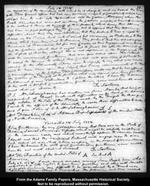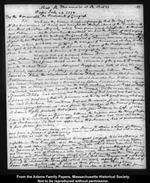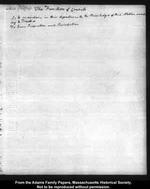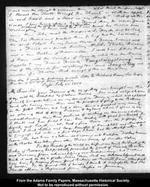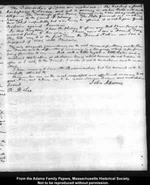Sheet A. This comes in at A sheet 37.
To the Honourable the President of Congress
Passi July 20. 1778
Sir
We have the honour to inform Congress, that the Spy Captain Niles, has arrived at Brest, and brought Us Ratifications of the Treaties with his Most Christian Majesty, which have given much Satisfaction to this Court and Nation.... On the Seventeenth instant, We had the honor of exchanging Ratifications, with his Excellency the Count de Vergennes. The Treaties, ratified, signed by his Majesty, and under the Great Seal of France, are now in our Possession, where, perhaps, considering the dangers of Ennemies at Sea, it will be safest to let them remain for the present. -- Copies of the Ratifications, We shall have the honour to transmit to Congress by this Opportunity.
War is not yet declared, between France and England by either Nation: but hostilities at Sea, have been already commenced by both, and as the French Fleet from Brest under the command of the Count D'Orvilliere and the British Fleet under Admiral Keppell, are both at Sea, We are in hourly expectation of Intelligence of a Rencounter between them. The Jamaica Fleet, the Windward Islands Fleet, and a small fleet from the Mediterranean, have arrived at London, which has enabled them to obtain, by means of a violent Impress, perhaps a thousand or fifteen hundred Seamen, who will man two or three Ships more; in the whole, making Admiral Keppells Fleet somewhat nearer to an Equality with the French. In the mean time, the Spanish Flota has arrived, but the Councils of that Court, are kept in a Secrecy so profound, that We presume not to say, with Confidence, what are her real Intentions. We continue however to receive from various quarters encouraging Assurances: and from the Situation of the Powers of Europe it seems highly probable, that Spain will join France, in Case of War.
A War in Germany, between the Emperor and the King of Prussia, seems to be inevitable, as it is affirmed, that the latter has marched his Army into Bohemia: so that We apprehend that America has at present nothing to fear from Germany.
We are doing all in our Power to obtain a Loan of Money: and have a prospect of procuring some in Amsterdam: but not in such quantities as will be wanted.
We are constrained to request Congress to be as sparing as possible in their Draughts upon Us.... The Draughts already made, together with the vast expence arising from the Frigates which have been sent here, the Expences of the Commissioners, the Maintenance of your Ministers for Vienna and Tuscany, and of Prisoners who have made their Escapes, the Amount of Cloaths and Munitions of War already sent to America: All these Things considered, We are under great Apprehensions, that our Funds will not be sufficient to answer the Draughts, which We daily expect, for the Interest of Loan Office Certificates, as well as those from Mr. Bingham.
We have the honour to inclose a Copy of a Letter from
Page a2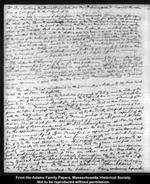
Mr. De Sartine, the Minister of State for the Marine, and to request the Attention of Congress to the Subject of it.
We are told in several Letters from the Honourable Committee of foreign Affairs, that We should receive Instructions and Authority, for giving up, on our part, the whole of the Eleventh and twelfth Article of the Treaty of Commerce, proposing as a Condition, to the Court of France, that they on their part should give up the whole of the Twelfth. But unfortunately those Instructions and that Authority were omitted to be sent with the Letters, and We have not yet received them. At the time of the Exchange of Ratifications however, We mentioned this Subject to the Count De Vergennes, and gave him an Extract of the Committees Letter. His answer to Us was, that the Alteration would be readily agreed to, and he ordered his Secretary not to register the Ratification untill it was done. We therefore request that We may be honoured with the Instructions and Authority of Congress, to sett aside these two Articles, as soon as possible, and while the Subject is fresh in memory.
The Letter to Mr. Dumas is forwarded: and in Answer to the Committees Inquiry What is proper for Congress to do for that Gentleman, We beg leave to say, that his extream Activity and Dilligence, in negotiating our Affairs, and his Punctuality in his Correspondence with Congress, as well as with Us, and his Usefulness to our cause in several other Ways, not at present proper to be explained, give him in our Opinion, a good title to two hundred Pounds Sterling a Year, at least.
The other Things mentioned in the Committee's Letters to Us, shall be attended to as soon as possible.
We have received also, the Resolution of Congress of Feb. 9. and the Letter of the Committee of the same date,impowering Us to appoint One or more suitable Persons to be commercial Agents for conducting the Commercial Business of the United States in France and other Parts of Europe.... But as this Power was given Us, before Congress received the Treaty, and We have never received it, but with the Ratification of the Treaty; and as, by the Treaty Congress is impowered to appoint Consuls in the Ports of France, perhaps it may be expected of Us, that We should wait for the Appointment of Consuls. At present Mr. John Bondfield of Bourdeaux, and Mr. J. D. Schweighauser at Nantes, both by the appointment of Mr. William Lee, are the only Persons, authorized as Commercial Agents. If We should find it expedient to give Appointments to any other Persons, before We hear from Congress, We will send Information of it, by the next Opportunity.... If Congress should think proper to appoint Consuls, We are humbly of Opinion, that the Choice will fall most justly as well as naturally on Americans, who are in our Opinion better qualified for this Business than any others; and the Reputation of such an Office, together with a moderate Commission on the Business they may transact, and the Advantages to be derived from Trade, will be a sufficient Inducement to undertake it, and a sufficient Reward for discharging the Duties of it.
Signed B. Franklin, Arthur Lee,John Adams

